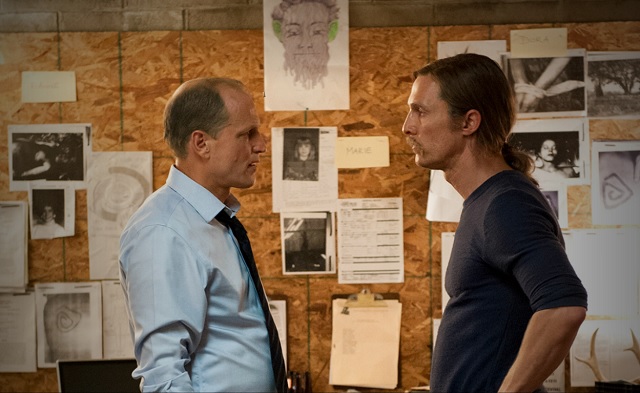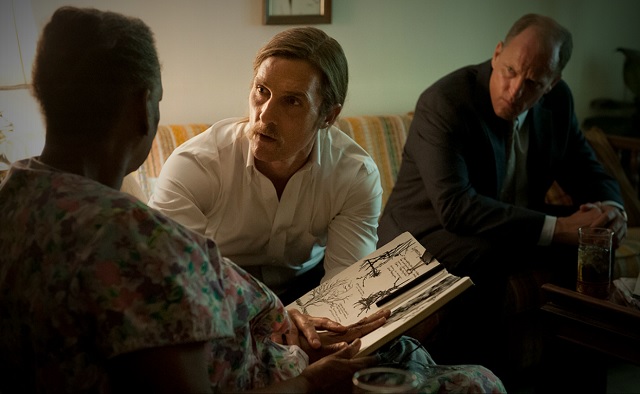True Detective, Season 1, Episode 7: “After You’ve Gone”
Written by Nic Pizzolatto
Directed by Cary Fukunaga
Airs Sundays at 9pm ET on HBO
With both Cohle and Hart walking out of their respective interrogations over the past two weeks, it, and Marty and Rust meeting each other for the first time in 2012, the investigation into Carcosa and the Yellow King seemed set to make a full transition to the present. Throughout the course of the story, it had become increasingly clear that Reggie was not the only one involved in Dora Lang’s murder, and that there was something deeper going on. This week’s episode once again returns the focus to the case, in a strong outing that illustrates how Rust and Marty have changed since the last time they spoke to each other.
The idea of leaving a lasting work behind is a strong theme running through this week’s episode. This theme is most obvious in the way Cohle behaves, particularly his obsession with the Dora Lang case. Despite the changes Rust has gone through in the decade since he quit police work, the case has kept clawing at him, as he points out to Marty, and Rust feels an obligation to see it through. But the idea is also present in Marty, as we see that his daughters and ex-wife are all thriving without him, all seemingly better off. While it’s the recorded tape of child molestation that provides the final push to Hart to help Cohle close the case, it’s entirely understandable that Marty would want to close the case even without that added motivation. After all, since his exit from the police force was inauspicious, he may be wondering how people are going to remember Marty Hart after his death. This idea is also hinted at in the story of Reverend Tuttle; along with keeping the pictures and videos secret for legal reasons, the knowledge of his activities would be bound to overshadow all the other work he has done, a fate he is unlikely to want.
It’s also interesting to note that, save for an initial tense meeting, Marty and Rust get along much easier in 2012 than they did during their time as detectives. In many ways, the two have become similar people. In the ensuing decade since the two last saw each other, Hart has become somewhat of a recluse, having gotten a divorce and thrown himself into his work. For his part, Cohle has become a more even-handed individual without the drugs, and less involved in his own musings as a result. This week shows both men more aware and genuinely interested in the world around them. In addition, both men are also in similar circumstances; no romantic attachments, and nothing significant in their lives outside the work they do. The combination of these factors makes both of them much more relatable to each other now than ever before. This equality also shows in their work, as Marty and Rust take an equal approach in questioning people for the most part in 2012. This stands in stark contrast to their work during their seven years of partnership, where Hart was content to sit back and let Cohle do most of the work, on occasion not getting out of the car to talk to people.
Overall, this is an excellent penultimate episode for the season. The interaction between Marty and Maggie in 2012 is very telling in how the divorce ended up better for everyone in the family except Marty. Maggie is living in a much nicer house, and Audrey and Maisie are either successful or on their way to success in their careers, while Marty is running his own business that is largely devoid of staff, and seemingly without much in the way of clients, and without a personal life to balance out his work. It will be interesting to see the attitude of Marty’s daughters towards him in 2012, and hopefully next week’s season finale provides an opportunity for a reunion. Audrey’s decision to become a painter also puts her childhood drawings of genitalia in a different perspective. With Cohle and Hart working together without conflict, as well as Gilbough and Papania now on their trail, it will be interesting to see how the perpetrators of Dora Lang’s murders react next week, particularly the man with facial scars who appears to be at the core of it all. How Cohle reacts to solving the case he has been following for 17 years is bound to be fascinating. Fukunaga and Pizzolatto have created a compelling show in only one season, and how they wrap things up next week will definitely be worth watching.
– Deepayan Sengupta




